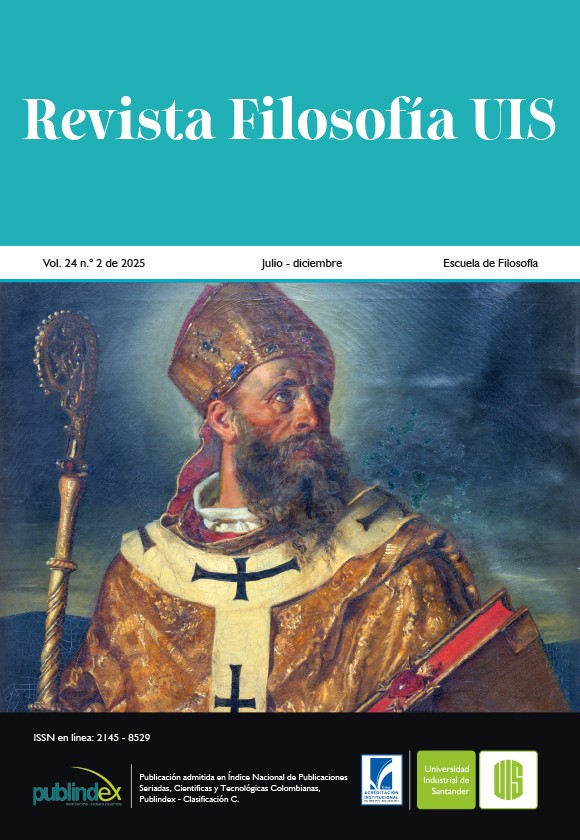Struggles for Cultural Unity: Historical Significance, Places of Enunciation and Production of Underlying Languages
Published 2025-03-29
Keywords
- significance,
- historical phenomenology,
- historicism,
- political languages
How to Cite
Copyright (c) 2025 Revista Filosofía UIS

This work is licensed under a Creative Commons Attribution 4.0 International License.
Abstract
The aim of this article is to reconstruct the notion of common sense as a desire to crystallize an era. It will identify the way in which cultural representations change over time and how their articulation generates material effects in the consolidation of the epistemic order and in the regulation of the social conflict from which it is not possible to escape. To answer this question, the genealogy of political languages will be used, according to the contributions of José Luis Villacañas, Elías Palti and Santiago Castro-Gómez, in order to examine the arrangements around the struggles for truth and their guiding effect on the social body. The article proposes a renewed understanding of historical knowledge, of cultural consciousness and of the significance that legitimizes truth, understanding that the consciousness of the era is not only a theory, but a know-how inscribed in pragmatic contexts. It is shown that empirical remains and the operations of myth transcend mere theory by being incorporated into the world and culture, crystallizing through historical phenomenology and historiography. This “good relationship” is identified as the best strategy to understand the “modern galaxy”.
Downloads
References
- Camelo, D. (2023). Discurso, política y verdad: Michel Foucault y la función del intelectual. Revista Filosofía UIS, 22(1), 225-249. https://doi.org.10.18273/revfil.v22n1-2023011
- Castro-Gómez, S. (2015). Historia de la gubernamentalidad I. Razón de Estado, liberalismo y neoliberalismo en Michel Foucault. Siglo del Hombre Editores.
- Castro-Gómez, S. (2016). Crítica de la razón Latinoamericana. Editorial Pontificia Universidad Javeriana.
- Castro-Gómez, S. (2017). Mirar en retrospectiva. Debates en torno a las genealogías de la colonialidad y el papel de la filosofía política en América Latina. En A. Salinas-Araya (Eds.), Filosofía política y genealogías de la colonialidad. Diálogos con Santiago Castro-Gómez (pp. 207-274). Cenaltes Ediciones.
- Castro-Gómez, S. (2022). La rebelión antropológica. El joven Karl Marx y la izquierda hegeliana (1835-1846). Siglo XXI Editores.
- Castro-Gómez, S. (2024). Transmodenidad: ensayo para una delimitación del concepto. En J. C. Cajigas, M. J. Flórez, C. A. López (Ed.), Entre la hybris y la república. Crítica decolonial y transmodernidad en el pensamiento de Santiago Castro-Gómez (pp. 245-289). Editorial Pontificia Universidad Javeriana.
- Foucault, M. (2006). Seguridad, territorio, población (H. Pons, Trad.). Fondo de Cultura Económica.
- Foucault, M. (2013). El orden del discurso (A. G. Troyano, Trad.). Tusquets Editores.
- Palti, E. (2002). La nación como problema. Los historiadores y la “cuestión nacional”. Fondo de Cultura Económica.
- Palti, E. (2004). Koselleck y la idea de Sattelzeit. Un debate sobre la modernidad y temporalidad. Revista Ayer. Historia de los conceptos (53), 63-74.
- Palti, E. (2007). El tiempo de la política. El siglo XIX reconsiderado. Siglo XXI Editores.
- Palti, E. (2021). Hans Blumenberg y su crítica de la historia conceptual. En F. A. Ortega, R. E. Acevedo, P. C. Castañeda (Eds.), Horizontes de la historia conceptual en Iberoamérica. Trayectorias e incursiones (pp. 471-494). Centro Editorial Facultad de Ciencias Humanas Universidad Nacional de Colombia.
- Villacañas, J. (1997). Kant y la época de las revoluciones. Ediciones Akal.
- Villacañas, J. (2017). Imperio, Reforma y modernidad. Vol. I. La revolución intelectual de Lutero. Escolar y Mayo Editores.
- Villacañas, J. (2022). Neoliberalismo como teología política. Habermas, Foucault, Dardot, Laval y la historia del capitalismo contemporáneo. NED Ediciones.
- Weber, M. (2014). Economía y sociedad (J.M. Echavarría, J.R. Parella, E. Ímaz, E.G. Máynez, J.F. Mora, & F.G. Villegas, Trads.). Fondo de Cultura Económica.

